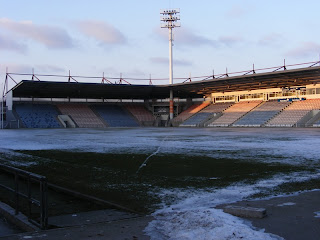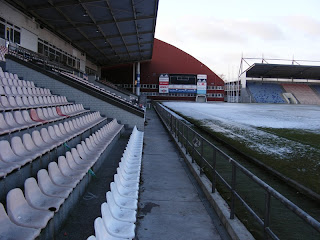
"Football here's like Celtic - Rangers," the Manchester United fan I work with once told me. "The Latvians had FK Riga until they went bust, the Russians have Skonto." Champions thirteen seasons in a row, nowadays Skonto are definitely the third force in Latvian football, their crowds usually no higher than three or four hundred. They had started well, quickly equalising an opening goal from Ventspils's Georgian winger Zurabs Mentešašvili, before running out of ideas in the second half. Now they found themselves two goals down.
To my left the fifty or so ultras, or the
Ghosts as they like to call themselves, were still beating drums and chanting something about Skonto in Russian. On the other side of the stand (there was only one open) Ventspils fans were letting off flares to celebrate their side's third goal. Paul Ashworth, Skonto's English manager, had his hands in his suit pockets, shaking his head like an angry Roy Keane. Looking up to make a forward pass, Skonto's Brazilian left-back trod on the ball. The laughter from the man next to me could be heard clear across the pitch.
Tickets: 3 lats.
 A twenty-minute walk from the nearest pub, or a Rory Delap throw-in's distance from either the Moray Firth or the main road north, the Tulloch Caledonian Stadium is a neat and tidy ground built with all the loving care of an edge-of-town outlet shopping centre. The main stand has its back to the water, the clubshop is a portakabin, and the nearest buildings of any note are a scrapyard and a bathroom tile warehouse.
A twenty-minute walk from the nearest pub, or a Rory Delap throw-in's distance from either the Moray Firth or the main road north, the Tulloch Caledonian Stadium is a neat and tidy ground built with all the loving care of an edge-of-town outlet shopping centre. The main stand has its back to the water, the clubshop is a portakabin, and the nearest buildings of any note are a scrapyard and a bathroom tile warehouse.





















